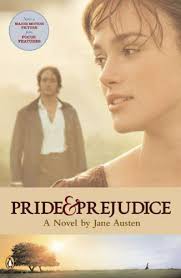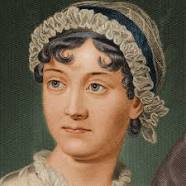Pride and Prejudice Page #15
Pride and Prejudice is a romantic novel by Jane Austen, first published in 1813. The story charts the emotional development of the protagonist, Elizabeth Bennet, who learns the error of making hasty judgments and comes to appreciate the difference between the superficial and the essential. The comedy of the writing lies in the depiction of manners, education, marriage, and money during the British Regency period.
On Sunday, after morning service, the separation, so agreeable to almost all, took place. Miss Bingley's civility to Elizabeth increased at last very rapidly, as well as her affection for Jane; and when they parted, after assuring the latter of the pleasure it would always give her to see her either at Longbourn or Netherfield, and embracing her most tenderly, she even shook hands with the former. Elizabeth took leave of the whole party in the liveliest of spirits. They were not welcomed home very cordially by their mother. Mrs. Bennet wondered at their coming, and thought them very wrong to give so much trouble, and was sure Jane would have caught cold again. But their father, though very laconic in his expressions of pleasure, was really glad to see them; he had felt their importance in the family circle. The evening conversation, when they were all assembled, had lost much of its animation, and almost all its sense by the absence of Jane and Elizabeth. They found Mary, as usual, deep in the study of thorough-bass and human nature; and had some extracts to admire, and some new observations of threadbare morality to listen to. Catherine and Lydia had information for them of a different sort. Much had been done and much had been said in the regiment since the preceding Wednesday; several of the officers had dined lately with their uncle, a private had been flogged, and it had actually been hinted that Colonel Forster was going to be married. Chapter 13 “I hope, my dear,” said Mr. Bennet to his wife, as they were at breakfast the next morning, “that you have ordered a good dinner to-day, because I have reason to expect an addition to our family party.” “Who do you mean, my dear? I know of nobody that is coming, I am sure, unless Charlotte Lucas should happen to call in--and I hope my dinners are good enough for her. I do not believe she often sees such at home.” “The person of whom I speak is a gentleman, and a stranger.” Mrs. Bennet's eyes sparkled. “A gentleman and a stranger! It is Mr. Bingley, I am sure! Well, I am sure I shall be extremely glad to see Mr. Bingley. But--good Lord! how unlucky! There is not a bit of fish to be got to-day. Lydia, my love, ring the bell--I must speak to Hill this moment.” “It is not Mr. Bingley,” said her husband; “it is a person whom I never saw in the whole course of my life.” This roused a general astonishment; and he had the pleasure of being eagerly questioned by his wife and his five daughters at once. After amusing himself some time with their curiosity, he thus explained: “About a month ago I received this letter; and about a fortnight ago I answered it, for I thought it a case of some delicacy, and requiring early attention. It is from my cousin, Mr. Collins, who, when I am dead, may turn you all out of this house as soon as he pleases.” “Oh! my dear,” cried his wife, “I cannot bear to hear that mentioned. Pray do not talk of that odious man. I do think it is the hardest thing in the world, that your estate should be entailed away from your own children; and I am sure, if I had been you, I should have tried long ago to do something or other about it.” Jane and Elizabeth tried to explain to her the nature of an entail. They had often attempted to do it before, but it was a subject on which Mrs. Bennet was beyond the reach of reason, and she continued to rail bitterly against the cruelty of settling an estate away from a family of five daughters, in favour of a man whom nobody cared anything about. “It certainly is a most iniquitous affair,” said Mr. Bennet, “and nothing can clear Mr. Collins from the guilt of inheriting Longbourn. But if you will listen to his letter, you may perhaps be a little softened by his manner of expressing himself.” “No, that I am sure I shall not; and I think it is very impertinent of him to write to you at all, and very hypocritical. I hate such false friends. Why could he not keep on quarreling with you, as his father did before him?” “Why, indeed; he does seem to have had some filial scruples on that head, as you will hear.” “Hunsford, near Westerham, Kent, 15th October. “Dear Sir,-- “The disagreement subsisting between yourself and my late honoured father always gave me much uneasiness, and since I have had the misfortune to lose him, I have frequently wished to heal the breach; but for some time I was kept back by my own doubts, fearing lest it might seem disrespectful to his memory for me to be on good terms with anyone with whom it had always pleased him to be at variance.--'There, Mrs. Bennet.'--My mind, however, is now made up on the subject, for having received ordination at Easter, I have been so fortunate as to be distinguished by the patronage of the Right Honourable Lady Catherine de Bourgh, widow of Sir Lewis de Bourgh, whose bounty and beneficence has preferred me to the valuable rectory of this parish, where it shall be my earnest endeavour to demean myself with grateful respect towards her ladyship, and be ever ready to perform those rites and ceremonies which are instituted by the Church of England. As a clergyman, moreover, I feel it my duty to promote and establish the blessing of peace in all families within the reach of my influence; and on these grounds I flatter myself that my present overtures are highly commendable, and that the circumstance of my being next in the entail of Longbourn estate will be kindly overlooked on your side, and not lead you to reject the offered olive-branch. I cannot be otherwise than concerned at being the means of injuring your amiable daughters, and beg leave to apologise for it, as well as to assure you of my readiness to make them every possible amends--but of this hereafter. If you should have no objection to receive me into your house, I propose myself the satisfaction of waiting on you and your family, Monday, November 18th, by four o'clock, and shall probably trespass on your hospitality till the Saturday se'ennight following, which I can do without any inconvenience, as Lady Catherine is far from objecting to my occasional absence on a Sunday, provided that some other clergyman is engaged to do the duty of the day.--I remain, dear sir, with respectful compliments to your lady and daughters, your well-wisher and friend, “WILLIAM COLLINS” “At four o'clock, therefore, we may expect this peace-making gentleman,” said Mr. Bennet, as he folded up the letter. “He seems to be a most conscientious and polite young man, upon my word, and I doubt not will prove a valuable acquaintance, especially if Lady Catherine should be so indulgent as to let him come to us again.”
Translation
Translate and read this book in other languages:
Select another language:
- - Select -
- 简体中文 (Chinese - Simplified)
- 繁體中文 (Chinese - Traditional)
- Español (Spanish)
- Esperanto (Esperanto)
- 日本語 (Japanese)
- Português (Portuguese)
- Deutsch (German)
- العربية (Arabic)
- Français (French)
- Русский (Russian)
- ಕನ್ನಡ (Kannada)
- 한국어 (Korean)
- עברית (Hebrew)
- Gaeilge (Irish)
- Українська (Ukrainian)
- اردو (Urdu)
- Magyar (Hungarian)
- मानक हिन्दी (Hindi)
- Indonesia (Indonesian)
- Italiano (Italian)
- தமிழ் (Tamil)
- Türkçe (Turkish)
- తెలుగు (Telugu)
- ภาษาไทย (Thai)
- Tiếng Việt (Vietnamese)
- Čeština (Czech)
- Polski (Polish)
- Bahasa Indonesia (Indonesian)
- Românește (Romanian)
- Nederlands (Dutch)
- Ελληνικά (Greek)
- Latinum (Latin)
- Svenska (Swedish)
- Dansk (Danish)
- Suomi (Finnish)
- فارسی (Persian)
- ייִדיש (Yiddish)
- հայերեն (Armenian)
- Norsk (Norwegian)
- English (English)
Citation
Use the citation below to add this book to your bibliography:
Style:MLAChicagoAPA
"Pride and Prejudice Books." Literature.com. STANDS4 LLC, 2025. Web. 10 Jan. 2025. <https://www.literature.com/book/pride_and_prejudice_9>.




Discuss this Pride and Prejudice book with the community:
Report Comment
We're doing our best to make sure our content is useful, accurate and safe.
If by any chance you spot an inappropriate comment while navigating through our website please use this form to let us know, and we'll take care of it shortly.
Attachment
You need to be logged in to favorite.
Log In